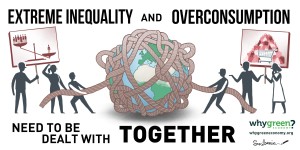Are some people consuming too much? (Katherine Trebeck)
 Katherine Trebeck is Global Research Policy Adviser at Oxfam. This is her response to the working paper: The inequality of overconsumption: The ecological footprint of the richest (published in November 2015 by the Global Sustainability Institute, Anglia Ruskin University).
Katherine Trebeck is Global Research Policy Adviser at Oxfam. This is her response to the working paper: The inequality of overconsumption: The ecological footprint of the richest (published in November 2015 by the Global Sustainability Institute, Anglia Ruskin University).
The issues of economic inequality and climate change are intrinsically linked. Katherine Trebeck, Policy and Research Advisor, suggests it’s time we started talking about the elephant in the room. In order for everyone to attain a basic decent standard of living some people need to consume less.
The richest 10% of people on the planet are responsible for 45% of global emissions, according to new research from Thomas Piketty and Lucas Chancel. Oxfam’s own analysis reveals strikingly similar figures. As the world focuses its attention on climate change during the COP21 conference this week these stats provide a stark picture of the relationship between economic inequality and climate change, and the way in which the world’s resources are currently being so inequitably shared.
In October we learned from Credit Suisse that the richest 1% of people own as much as the bottom 99%, a shocking reality which Oxfam research had predicted, (though, depressingly, for a year further ahead). A growing chorus of people, from the Pope to Christine Lagarde, from Barack Obama to the World Economic Forum, are bemoaning such levels of income and wealth inequality as too high. Some do so for economic reasons, citing its suppression of growth. Others view this situation (where so few own so much whilst hundreds of millions of people live in extreme poverty) as a slight on justice and beyond moral acceptability.
It is tempting to hope that the deeply flawed conventional wisdom which says inequality is nothing to worry about if an economy is growing is (finally) being knocked from its perch, with Jim Kim explicitly rejecting ‘trickle down economics’ just last month.
But in this (very timely) debate about the causes, impacts, and solutions to problematic levels of economic inequality, there is a critical dimension that seem to be missing from the conversation. Specifically, when people talk about inequality, it is all too rare to hear them talk about the impact of human beings on our planet; how we have lived beyond the planet’s biocapacity since the 1970s (meaning that 1.6 Earths are required to sustain our current use of nature). And when people talk about the deleterious impact of human beings on our planet, it is all too rare to hear them talk about inequality (let alone inequality in terms of both the causes and consequences of changes to our environments by and for different individuals).
But if we allow conversations about economic inequality and environmental impact to continue down parallel, but separate, tracks, then our understanding of what needs to change will remain partial, misdirected, and victim to the tyranny of averages. Our discussion will descend into abstract debate about population size or per capita consumption levels. In a way it seems as if one of the last taboos is asking the question: are some people, to put it simply, consuming too much? Should we be pointing to people taking more than their fair share of the earth’s resources to the extent that this undermines the scope for those who need more consumption to attain even a basic standard of living?
Shining a light on this apparently unmentionable issue is crucial. While technological advances might buy us some wriggle room, if we take the notion of Planetary Boundaries and its implications seriously, ultimately we are looking at a zero sum game. In the current scenario overconsumption by some is possible only on the proviso of under-consumption by others.
Inequality is written into the system unless we create a new system in which the goal is not more material wealth per se, but more equitably sharing and more efficiently use of the resources that our earth provides.
A new paper from the Global Sustainability Institute focuses on the very top of the distribution. It looks at the excessive consumption of the richest people, who not only capture more economic resources, but also have lifestyles which, too often, have a disproportionate impact on our planet.
The author of this research, Dario Kenner, found that based on household expenditure surveys in the US, Japan, China, UK, and France the richest 10% of the population (by income) spend more than each of the income deciles below them on private transport and on meat.
Part of this expenditure can be attributed to a process of emulation amongst high income groups which propels conspicuous consumption. The World Business Council for Sustainable Development notes that we tend to see conspicuous and competitive consumption ‘where there is heavy societal pressure to maintain high consumption patterns and where competitive spending and displays of wealth are encouraged by society’.
But not only do the rich live lifestyles that create harmful impacts on the planet (and entice and cajole others to do so), when the planet is pushed into a state of climate chaos, the richest are able to dip into their deep pockets for protection. They can easily pay to repair their homes and cover insurance costs; they can afford air conditioning in heat waves; and housing outside of flood risk areas.
Attempts to address both inequality and unsustainable consumption need to take account of Kenner’s warning that some extremely rich people might be ‘disconnected from the reality of the ecological crisis’. He also warns that ‘environmental taxes may have less effect on [such people] because they can afford to continue polluting; and [they] may not respond to sustainable consumption information initiatives’.
The sooner we extricate the debate from the tyranny of averages and look at just who it is who is putting most pressure on the planet, the sooner we can develop appropriate policies to stop the few allowing the majority to bear the brunt of a crisis they did little to create.
 Read the full working paper:
Read the full working paper:
The inequality of overconsumption: The ecological footprint of the richest

Leave a Reply